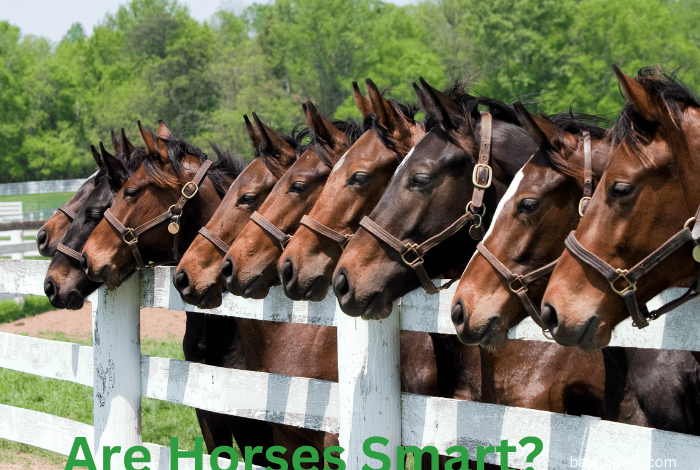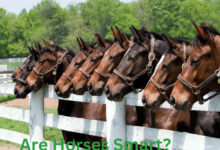Are Horses Smart? Understanding the Intelligence of Our Equine Friends

When we think about animals and their intelligence, Are horses smart the first creatures that often come to mind are dogs, dolphins, or perhaps even elephants. But what about horses? Are horses smart? This question has been asked by animal lovers, researchers, and horse owners for centuries. Horses have long been valued for their strength, beauty, and companionship, but their intelligence is often overlooked or underestimated. In this article, we will delve deep into the cognitive abilities of horses, examining their learning skills, memory, and problem-solving abilities.
What Makes an Animal Smart?

Before we dive into the specifics of whether Are horses smart are smart, it’s important to define what we mean by “smart.” In the animal kingdom, intelligence is generally measured by an animal’s ability to learn, adapt to new situations, solve problems, and communicate. A smart animal is often one that can quickly learn from experience, understand its surroundings, and respond appropriately to different challenges.
How Do We Measure Intelligence in Animals?
Researchers use several methods to measure animal intelligence. These include:
- Problem-solving abilities: Can the animal figure out how to get food or navigate through obstacles?
- Learning and memory: How well does the animal retain information and adapt to new situations?
- Social behavior: How well does the animal communicate and interact with others?
- Self-awareness: Can the animal recognize itself in a mirror, indicating a level of self-awareness?
Now that we have a better understanding of what makes an animal smart, let’s explore how horses measure up in these areas.
Horses and Their Ability to Learn
One of the first things that comes to mind when thinking about a horse’s intelligence is its ability to learn. Horses are quick learners, and their training is often based on positive reinforcement, where they are rewarded for performing a task correctly. But are horses as intelligent as we think they are when it comes to learning?
Horses Can Learn Through Repetition
Like many animals, horses learn best when they are repeatedly exposed to certain tasks. For example, a horse can learn commands such as “walk,” “trot,” and “canter” through consistent training and repetition. This is because horses have excellent associative learning abilities. In simple terms, they can connect an action (like walking) with a reward (like a treat or praise).
Horses Understand Basic Cues
Horses are also known for their ability to understand basic verbal and non-verbal cues from humans. These cues can include:
- Voice commands: Horses can learn to respond to specific words, such as “whoa” or “giddy-up.”
- Body language: Horses are highly attuned to the body language of both humans and other horses. They can interpret gestures, postures, and even facial expressions to understand what is being communicated.
This level of learning suggests that horses possess a certain level of intelligence, as they can remember and respond to human cues in a way that requires cognitive processing.
Are Horses Smart When It Comes to Memory?
Memory is another important factor when considering the intelligence of animals. Horses have been shown to possess remarkable memory skills, both short-term and long-term. So, how does a horse’s memory compare to that of other animals?
Short-Term Memory
Horses have an impressive short-term memory. They can remember information for some time and use it to navigate their environment. For instance, a horse may remember a specific path or a location where it was trained to perform a task, even if it hasn’t been there for a while.
Long-Term Memory
Horses also have excellent long-term memory. They can remember people, places, and experiences for years. Many horse owners can attest to the fact that horses remember people they’ve met, even if it’s been a long time since the encounter. This suggests that horses possess long-term memory abilities comparable to those of humans and other intelligent animals.
Horses can remember both positive and negative experiences. For example, a horse that has been treated poorly in the past may remember that person or situation and react accordingly. This indicates a level of emotional intelligence as well.
Problem-Solving Abilities in Horses
When it comes to intelligence, problem-solving is often a key indicator. Are horses capable of solving problems on their own, or do they need humans to guide them through challenges? Let’s take a look at some examples of how horses have demonstrated problem-solving abilities.
Horses Can Figure Out How to Unlock Gates
Horses have been known to solve simple problems like unlocking gates or finding ways to escape from their stables. While it’s not common for every horse to do this, some have been observed manipulating latches, gates, or fences to break free. This behavior is not random; it suggests that horses have the cognitive ability to analyze a situation and determine the best course of action to achieve a desired outcome.
Horses Can Learn to Solve Puzzles
In more controlled environments, horses have also been trained to solve puzzles. These puzzles may involve figuring out how to open a box to retrieve a treat or solve a maze. Horses can perform these tasks by using their memory and problem-solving skills, showing a level of intelligence that goes beyond basic learning.
Horses and Emotional Intelligence
Emotional intelligence is the ability to understand and manage one’s own emotions, as well as the emotions of others. This type of intelligence is crucial for social animals, and horses are no exception.
Horses Can Read Human Emotions
Research has shown that horses are highly sensitive to human emotions. They can read the mood of a person based on their facial expressions and body language. If a human is anxious, frustrated, or angry, a horse may respond by becoming nervous or agitated. On the other hand, if a human is calm and relaxed, the horse may mirror this behavior and remain at ease.
Horses Form Strong Emotional Bonds
Horses are also known for forming strong emotional bonds with other horses and humans. These bonds can be seen in the way horses interact with their caregivers and their fellow horses. Horses that have been treated with care and respect will often display loyalty and affection, further indicating their emotional intelligence.
Are Horses Smart in the Wild?
While many of the intelligence-related traits we’ve discussed are seen in domesticated horses, what about horses in the wild? Do wild horses exhibit the same level of intelligence as those living under human care?
Survival Instincts
Wild horses are incredibly intelligent when it comes to survival. They use their keen senses to detect predators, navigate their environment, and find food and water. Wild horses have an incredible ability to remember safe grazing areas and water sources, and they work together in herds to protect each other from danger.
Social Structure and Cooperation
Horses in the wild also display intelligence through their social structure. Wild horses live in herds, where cooperation and communication are key to survival. Horses in a herd work together to maintain safety, alert each other to danger, and care for their young. This sense of cooperation is a sign of social intelligence, as it requires each horse to understand its role and function within the group.
Conclusion: Are Horses Smart?
After examining the cognitive abilities of horses, it’s clear that horses are, indeed, smart animals. They may not solve complex math problems or speak multiple languages, but horses exhibit intelligence in ways that are just as important. Their ability to learn, remember, solve problems, and connect emotionally with humans and other animals highlights their impressive cognitive abilities.
So, the next time you ask, “Are horses smart?” remember that the answer is a resounding yes. Horses possess a unique intelligence that allows them to adapt to their environments, communicate with humans and other horses, and navigate challenges. Their smarts go beyond simple tricks and commands—they are complex, emotionally intelligent beings capable of forming lasting bonds and solving problems.
Whether you’re a horse owner, an animal lover, or simply someone who appreciates the beauty of these magnificent creatures, it’s clear that horses are much smarter than we often give them credit for.

